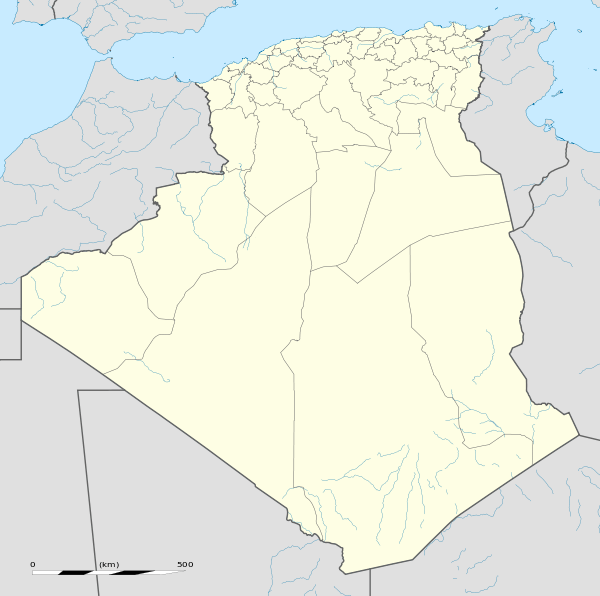Madauros
 Ruis of Madauros | |
 Shown within Algeria | |
| Location | Algeria |
|---|---|
| Region | Souk Ahras Province |
| Coordinates | 36°04′36″N 7°49′12″E / 36.076667°N 7.82°E |
Madauros (Madaurus, Madaura) was a Roman-Berber city and a former diocese of the Catholic Church in the old Roman province of Numidia.
History
Madaurus was made a Roman colony at the end of the first century and was famous for its "schola". A colony of veterans was established there; it was called Colonia Flavia Augusta Veteranorum Madaurensium under emperor Nerva.[1] It was the native town of Apuleius, known as author of the famous novel The Golden Ass, who was born there in 123 AD.[2] Saint Augustine of Hippo was a student there.
The city was fully Romanised in the fourth century, with a population of Christian Berbers, who spoke mainly Latin, according to Theodore Mommsen.[3]
Madauros was the see of a Christian diocese. There were three famous bishops of this diocese: Antigonus, who celebrated the Council of Carthage in 349 AD; Placentius, who celebrated the 407 and 411 AD Christian Conference; and Pudentius who was forced into exile, alongside others present at the Christian conference of 484 AD, because of the vandal king Huneric.
The city of Madaurus, known since 300 BC, did not survive to the Arabic invasions of the late seventh century. Probably it was destroyed by its inhabitants themselves by order of Kahina, the so-called "Beautiful Romano-berber Queen".
The ruins of Madauros are close to the actual city of M'Daourouch, in current Algeria. It is possible to see:
- A Roman mausoleum with some statues.
- A Roman theater, reduced in size because of a Byzantine fortification made in 535 AD.
- Some small "Roman thermae".
- A Roman basilica of the Byzantine era with 3 sections of columns.
- Some epitaphs, with Latin inscriptions.
See also
| Wikimedia Commons has media related to Madaure. |
Notes
- ↑ Perseus: Madauros
- ↑ Apuleius (123–180 AD), works of the famous Romano-Berber writer
- ↑ Theodore Mommsen. The Provinces of the Roman Empire. Section: Africa
Bibliography
- Gurney, Hudson The works of Apuleius Publisher Bell (University of California Libraries). London, 1878
- Gsell, Stephane. Histoire ancienne de l'Afrique du Nord en 8 tomes, Inscriptions de Madaure, ibid., p. CLXX-CLXXIV. Paris, 1922.
- Mommsen, Theodore. The Provinces of the Roman Empire. Barnes & Noble Ed. New York, 2005
%2C_Algeria_04966r.jpg)